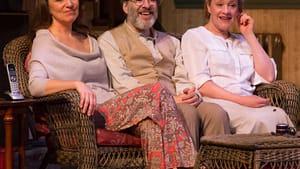Stay in the Loop
BSR publishes on a weekly schedule, with an email newsletter every Wednesday and Thursday morning. There’s no paywall, and subscribing is always free.
Six characters in search of a catalyst
Durang’s ‘Vanya and Sonia’ by PTC

Chekhov’s greatest plays presciently anticipated the decline of Russia’s ruling class by portraying aristocrats so weighted down by family, property, and isolation from the real world that they lacked a reason to get up in the morning. The three modern-day siblings in Christopher Durang’s witty if lightweight comedy Vanya and Sonia and Masha and Spike suffer an additional burden: Their parents, both Chekhov scholars, named their children after Chekhov characters, thus presumably condemning the kids to the same Chekhovian lives of gloomy inertia.
Durang’s Vanya and Sonia have lived in the same remote Bucks County family farmhouse for 45 years — “just two bumps on a log,” as Vanya puts it, waiting hopelessly for their lives to begin in a house where “Nothing ever changes” while living off their movie star sister, Masha. (Vanya is a gay man who isn’t even sure if he ever came out.) Masha, by contrast, exudes glamor and self-confidence in wretchedly excessive quantities and rarely visits because, she explains, “Every time I come to this house, I feel unhappy.”
Yet beneath her brassy façade, Masha is as self-pitying as her miserable siblings: At 41, her youth, good looks, sexy parts, and lovers are beginning to desert her, much like her five ex-husbands. So while Sonya sobs, “I haven’t lived!,” Masha sobs, “My life is over!”
Voodoo housekeeper
The saving grace of these siblings lies in their Chekhovian self-consciousness — specifically, their readiness to acknowledge and even joke about their inability to take control of their lives. They eschew drugs because, Sonia explains, "If everyone took antidepressants, Chekhov would have had nothing to write about.”
So throughout the first act we wonder: What force will spring these gloomy Gusses from their psychological cocoons? In effect Durang poses a puckish literary question: If Chekhov’s characters were given a second chance to pursue the road less taken, where would they have gone?
Durang teases us with three possible external catalysts: Spike is Masha’s young, airheaded, and gorgeous male-model boyfriend of the moment, constantly stripping to display his only discernible asset: his muscular body. Nina is a young and naïve neighbor who basks in Masha’s reflected glow because “I love to be around creative people.” The most ill-fitting character is Cassandra, the family’s assertive Haitian housekeeper, a voodoo practitioner who seems so genuinely confident and clairvoyant that you wonder why she’s cleaning houses in Bucks County when she should be in Washington, directing our foreign policy.
Eventually, the mousy Sonia blossoms at a party where, in costume, she becomes the elegant Maggie Smith preparing to accept an Academy Award. Vanya, for his part, finally discovers his inner lion when, in a rage at young Spike’s preoccupation with texting and tweeting, he delivers an angry rant against today’s allegedly clueless youth that’s also a paean to the pre-computer past. (“We licked postage stamps! We had no answering machines — you had to call people back!”)
Portable spotlights
Yet the passage of time that Vanya laments ultimately becomes the liberating catalyst. Masha’s fears of financial insecurity as she ages convince her to sell the house, thereby forcing Vanya and Sonia to fend for themselves — and, as a byproduct, to gain new appreciation for the life they’ve led so far, not to mention for Masha’s past support. Masha, for her part, discovers after a rudderless life that the weight of family has its compensations.
There’s plenty of food for thought here, and Durang has sprinkled it with enough witty banter — a bit too much for my taste — to render it easily digestible. In Philadelphia Theatre Company’s current production, Durang benefits from a stellar cast, especially Deirdre Madigan as Sonia and Kraig Swartz as Vanya — two actors who display unusual range in unusual roles. Grace Gonglewski as the movie queen Masha and Kianné Muschett as the equally assertive housekeeper Cassandra fill more stereotypical roles with predictable flair, seemingly carrying built-in spotlights whenever they appear on stage.
As another movie queen, the real-life French actress Jeanne Moreau, once put it, “It is not the rich who are powerful; it is the people who feel themselves free.” That — and not merely the decline of the Russian nobility — is what Chekhov is about, and ultimately it’s what Vanya and Sonia and Masha and Spike is about too.
What, When, Where
Vanya and Sonia and Masha and Spike. By Christopher Durang; James J. Christy directed. Philadelphia Theatre Company production through April 20, 2014 at Suzanne Roberts Theatre, 480 S. Broad St. (at Lombard), Philadelphia. 215-985-0420 or PhiladelphiaTheatreCompany.org.
Sign up for our newsletter
All of the week's new articles, all in one place. Sign up for the free weekly BSR newsletters, and don't miss a conversation.

 Dan Rottenberg
Dan Rottenberg